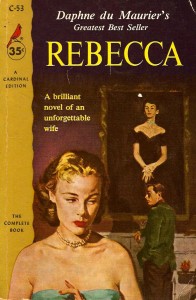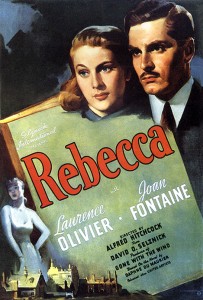
Rebecca—Daphne Du Maurier–1938–IP
I was surprised when I realized I hadn’t yet written a synopsis for this classic well-known title. Well-known if like me, you love Hitchcock and/or read mysteries. “Last night I dreamt I went to Manderley again” should be in the collective unconscious by now! If you’ve never read those lines, or heard Joan Fontaine speak them at the beginning of the film of the same name, you are among the few, and are in for a fantastic treat. Rebecca is titled for a dead woman, one that controls most of the action within the book–from the grave. A Gothic of the best form, it’s plot served as the outline for countless imitations to come. I think as a pre teen I may have read them all. The general plot line for those that try to capture the haunting lure of the original revolves around a woman meeting a mysterious handsome man and after a whirlwind romance of usually a week or so, hastily marries and is swiftly transported to a) the family manse, b) a castle on a cliff also the family manse, c) a terrifying hunk of a mansion, also the family manse, or d) a monstrosity of a house in a wilderness of the moors, sea cliff, or island, also the family manse. There his hostile family await, perhaps an ex-lover or two, a brooding brother, who may or may not be more handsome, and a housekeeper of seething emotions. And, most important, some former lover, or wife of the new husband has died mysteriously–perhaps at his hands!

The only aspects these latecomers have in common with Rebecca, are the general broad outlines of; handsome suitor, quickie marriage, nasty housekeeper, possible murdered past wife, lover, and gigantic mansion of usually ugly or terrifying properties. Someone is quoted as saying–the most important character in one of these Gothics is the house. I agree. And on this point, it’s also true of Manderley, the estate of Maxim de Winter, a rich and troubled man who while in Monte Carlo, meets and proposes to a shy, plain, rich woman’s companion. Mrs. de Winter narrates the book therefore all the action is seen through her eyes. Upon arriving at Manderley, she is greeted by Mrs. Danvers, the housekeeper whose devotion to the deceased first Mrs. de Winter, borders on fanaticism. As we find later in the book, Mrs. Danvers crosses that border. The plot is rife with foreshadows, uneasiness, and shifty characters. One large incident occurs when the de Winters decide to throw a costume ball, and Mrs. Danvers convinces Mrs. de Winter to have a copy made of a antique gown in a ancestral painting as her outfit. Little did she realize that Rebecca wore such as gown and when Maxim catches a glimpse of the new wife thus robed, he has a conniption, exactly what Danvers wanted. What the narrator doesn’t realize until late in the day is that her husband isn’t still in love with Rebecca and that’s why he loathes to hear her name, but that he hated her with such a passion that he. . .
Well, if you’ve not read the novel or seen the film, far be it for me to spoil it for you, and if you have, you know everything there is to know anyway.
Don’t forget to check out the entire list of Best 100 Mysteries of All Time.
